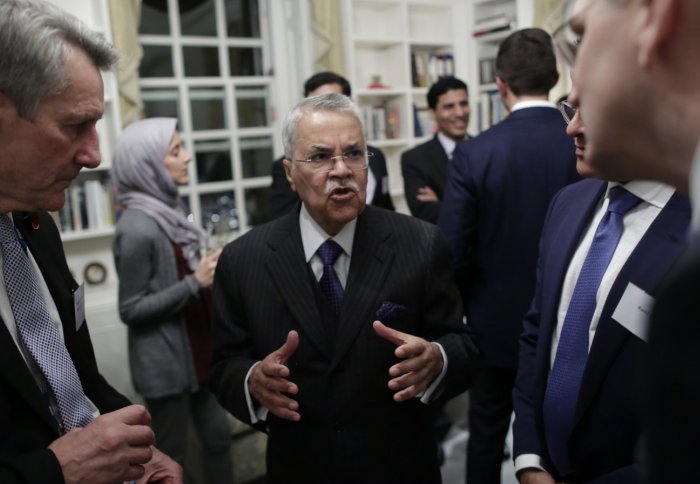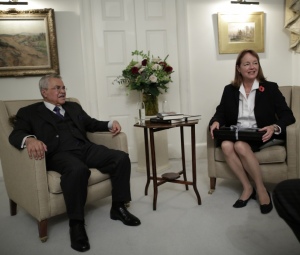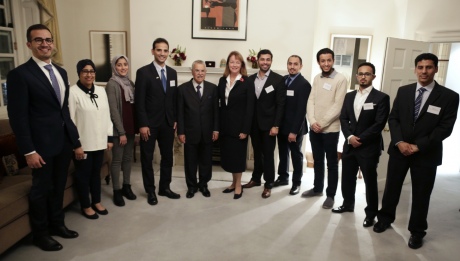World's 'most powerful' energy leader talks oil, crises and science at Imperial

His Excellency Ali Ibrahim Al-Naimi at Imperial
The Chair of King Abdullah University of Science and Technology, Mr Ali Al-Naimi, visited Imperial yesterday, meeting Saudi students and academics.
Mr Al-Naimi served as Minister of Petroleum and Mineral Resources for Saudi Arabia served as Minister from 1995 and 2016, making him the de facto leader of OPEC and one of the world’s most important economic and political figures – often referred to as Global oil’s ‘central banker’.
For decades his utterances moved markets. Time Magazine and Bloomberg have named him as one of the world’s most influential people. Alan Greenspan described Al-Naimi as “the most powerful man you’ve never heard of.” His autobiography, ‘Out of the Desert’ is published today by Penguin.

Ali Al-Naimi with President Gast
In a conversation with President Alice Gast in front of a group of scientists, engineers, students and friends, Mr Al-Naimi recounted his extraordinary rise from a “hunter gatherer” life as a nomadic Bedouin boy who lied about his age to get work, to “the digital age” when he became the energy industry’s most important player.
Crises, fishing and endowments
Mr Al Naimi spoke about his experiences in crises, like the first Gulf War, when Saddam Hussein’s invasion of Kuwait and threat to Saudi oil fields sent shockwaves around the world.
At the start of the invasion, Mr Al-Naimi, then President and CEO of Saudi Aramco, was in the United States to speak at the Aspen Institute. When the news broke, and as he was planning his return to Saudi Arabia, Mr Al-Naimi bumped into both the UK Prime Minister Margaret Thatcher and US President George Bush. They gave him the same message: “this invasion will not stand.”
“In all my life, I have never enjoyed a project like [KAUST]
– Mr Ali Al-Naimi
Chair, King Abdullah University of Science and Technology (KAUST)
He returned to Saudi Arabia, where he helped Aramco set-up a 24 hour watch of the oil fields, distribute gas masks and deal with the logistical and communications challenge of distinguishing “non-essential" from "essential" staff, with a calm head, ready to weather the crisis.
Mr Al-Naimi told the Imperial audience about how, a few years later, he received news of his appointment as Saudi Arabia’s Minister of Petroleum and Mineral Resources while salmon fishing – and avoiding bears – in rural Alaska. After missing the call from Jeddah, which he had assumed was unimportant, he finally got the message and cut that fishing trip short.
Perhaps the highlight of Mr Al-Naimi’s career came outside of the energy industry, when he worked with King Abdullah to found KAUST, a major science and technology research university, within just two years.
He negotiated an endowment of $20 billion – thanks in part to rising oil price at the time – which, as King Abdullah told Al-Naimi “is really a lot of money”. Al-Naimi’s team went to the world’s leading research institutions, including Imperial, MIT and Harvard to find inspiration and collaborators, and helped develop postgraduate education programmes that have made KAUST graduates some of the most in-demand in the world.
As Al-Naimi told the late King: “In all my life, I have never enjoyed a project like this.”

Ali Al-Naimi with Imperial students and President Gast
Student views
At the event, Mr Al-Naimi took the chance to meet some of Imperial’s Saudi students, including Saeed Alshihri, founder and former head of Imperial’s Saudi Student Society, who is completing a PhD student in chemical engineering. Saeed said: “Ali Al-Naimi is one of the most influential people in Saudi Arabia and the world. I admire his leadership and the way he has handled so many transitions from era to era. It is an honour to hear him talk.”
MSc student Hishem Al Hasan also enjoyed the talk. He discussed with other Saudi students how much he was enjoying life in London, “the world’s greatest city”, and the “satisfying challenges of studying at Imperial”.
Article text (excluding photos or graphics) © Imperial College London.
Photos and graphics subject to third party copyright used with permission or © Imperial College London.
Reporter
Andrew Scheuber
Communications Division